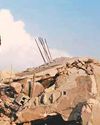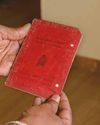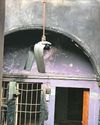
IN the first week of July, during the eruption of the ‘anti-discrimination student movement’ in Bangladesh demanding quota reform, I was in Dhaka. Having closely observed most recent student movements in the country, I paid particular attention to this one from its outset. By the second week of July, when I returned to Delhi, the protests were still ongoing. On the very day of my return, news broke of an attack on students at Jahangirnagar University, my alma mater. Under the cover of darkness, they were assaulted, with female students among those injured. That night, I could not sleep—it felt as if a shadow of the oppressive Pakistani regime had returned to Bangladesh.
On July 17, the martyrdom of Abu Sayeed infused new fervour into the resistance against Sheikh Hasina’s governance. However, that very night, the internet was shut down across the country, cutting off communication. During this blackout, I spent my days in dialogue with Indian journalists, trying to amplify the movement’s story. To steady my own resolve, I immersed myself in reading Jahanara Imam’s book Days of ’71. As someone representing this generation, I found deep parallels between the July uprising and the heroic struggle of Bangladesh’s liberation war in 1971.
Much like the period following 1971, Bangladesh is currently navigating a transitional phase in the post-Hasina era. This moment is marked by widespread chaos, trauma, anxiety and heightened societal expectations. However, it is commendable that despite the upheaval, the country has managed to avoid descending into civil war or communal riots—a testament to the resilience of its society, government and other stakeholders. Nevertheless, the young generation, in particular, is grappling with the lingering effects of postconflict trauma.
Diese Geschichte stammt aus der January 21, 2025-Ausgabe von Outlook.
Starten Sie Ihre 7-tägige kostenlose Testversion von Magzter GOLD, um auf Tausende kuratierte Premium-Storys sowie über 8.000 Zeitschriften und Zeitungen zuzugreifen.
Bereits Abonnent ? Anmelden
Diese Geschichte stammt aus der January 21, 2025-Ausgabe von Outlook.
Starten Sie Ihre 7-tägige kostenlose Testversion von Magzter GOLD, um auf Tausende kuratierte Premium-Storys sowie über 8.000 Zeitschriften und Zeitungen zuzugreifen.
Bereits Abonnent? Anmelden

Nomadland
All eyes are on President-elect Donald Trump and his policy on immigration

Far from Home
We have forgotten the plight of Afghans who fled to India, and continue to suffer

Bang Bang That Awful Sound
What happens when we listen closely to the soundscape of war?

Refugee Dilemma
For most Indian-origin Sri Lankan Tamils, who are victims of ethnic conflict and civil war, proving that they are not illegal migrants is a nearly impossible task

They Poured Fire on Us
The resilience of refugee women from Sudan, Ethiopia and Yemen in the face of war and displacement is remarkable

The Sound and the Fury
Iraqi poet, novelist, translator and scholar Sinan Antoon was born and raised in Baghdad.

The Day I Became a Woman
In a country where authorities have been directly engaging in the gruesome war against women for decades, artists like Nahid Hassanzadeh stand apart as a voice of dissent–a haunting reminder of the unwavering spirit of the rebellious Iranian women fighting against the Islamic Republic’s violent crackdown.

The Kite Runner
The official figure of civilian deaths in Afghanistan is a serious underestimate. It is unlikely that we will ever know the real cost of Afghan lives

American Patriot
Barring a few exceptions, Hollywood movies continue to be gung-ho about the United States' penchant for waging wars across the globe
